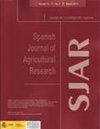Effects of dietary mannan oligosaccharides and coated calcium butyrate on performance, carcass parameters, blood biochemistry and meat quality of growing Japanese quails
IF 0.8
4区 农林科学
Q3 AGRICULTURE, MULTIDISCIPLINARY
引用次数: 0
Abstract
Aim of study: Despite previous research into mannan oligosaccharides (MOS) and calcium butyrate coated with palm oil (CCB) in poultry, there is a notable gap in the literature regarding the effects of these feed additives, either individually or in combination, on the growth performance, carcass values, blood biochemistry, immune response, and meat quality of growing Japanese quails. Area of study: Türkiye Material and methods: A total of 168 mixed-sex one-day-old quails were randomly allocated to one of four treatment groups, with each group containing 7 birds per cage. The control group was fed a basal diet, while the treatment groups received the following additives: 1 g/kg of CCB, 2 g/kg of MOS, and a combination of MOS+CCB added to the basal diet, respectively. Main results: None of the treatments had a significant impact on performance, relative organ weights, total protein, albumin, globulin, total cholesterol, high-density lipoprotein cholesterol, and lipoprotein lipase concentrations in blood serum, or humoral immunity on day 28. However, the inclusion of MOS and CCB in the diet, either individually or in combination, increased carcass yield and reduced low-density lipoprotein cholesterol and triglyceride levels in the blood serum. Additionally, these additives helped maintain optimal pH levels and lower malondialdehyde concentrations in the breast meat. Moreover, the combination of MOS + CCB significantly improved water holding capacity and antibody titers against the Newcastle Disease vaccine on day 42 in Japanese quails. Research highlights: The natural feed additives CCB and MOS contribute to enhanced carcass yield, improved meat quality, and strengthened humoral immunity, while simultaneously lowering lipid values in the bloodstream.饲粮添加甘露寡糖和包被丁酸钙对生长期日本鹌鹑生产性能、胴体参数、血液生化和肉品质的影响
研究目的:尽管已有关于甘露寡糖(MOS)和丁酸钙包覆棕榈油(CCB)在家禽中的应用的研究,但关于这些饲料添加剂单独或组合对生长中的日本鹌鹑的生长性能、胴体值、血液生化、免疫反应和肉品质的影响,文献中存在明显的空白。
研究领域: rkiy
材料与方法:将168只1日龄混合性别鹌鹑随机分为4个处理组,每笼7只。对照组饲喂基础饲粮,试验组分别在基础饲粮中添加1 g/kg CCB、2 g/kg MOS和MOS+CCB的组合。
主要结果:两种处理对第28天的生产性能、相对脏器重量、血清总蛋白、白蛋白、球蛋白、总胆固醇、高密度脂蛋白胆固醇和脂蛋白脂肪酶浓度或体液免疫均无显著影响。然而,在日粮中单独或联合添加MOS和CCB均可提高胴体产量,降低血清中的低密度脂蛋白胆固醇和甘油三酯水平。此外,这些添加剂有助于保持最佳的pH值水平和降低胸脯肉中的丙二醛浓度。此外,MOS + CCB组合在第42天显著提高了日本鹌鹑的持水能力和抗新城疫疫苗的抗体滴度。研究重点:天然饲料添加剂CCB和MOS有助于提高胴体产量,改善肉质,增强体液免疫,同时降低血液中的脂质值。
本文章由计算机程序翻译,如有差异,请以英文原文为准。
求助全文
约1分钟内获得全文
求助全文
来源期刊

Spanish Journal of Agricultural Research
农林科学-农业综合
CiteScore
2.00
自引率
0.00%
发文量
60
审稿时长
6 months
期刊介绍:
The Spanish Journal of Agricultural Research (SJAR) is a quarterly international journal that accepts research articles, reviews and short communications of content related to agriculture. Research articles and short communications must report original work not previously published in any language and not under consideration for publication elsewhere.
The main aim of SJAR is to publish papers that report research findings on the following topics: agricultural economics; agricultural engineering; agricultural environment and ecology; animal breeding, genetics and reproduction; animal health and welfare; animal production; plant breeding, genetics and genetic resources; plant physiology; plant production (field and horticultural crops); plant protection; soil science; and water management.
 求助内容:
求助内容: 应助结果提醒方式:
应助结果提醒方式:


